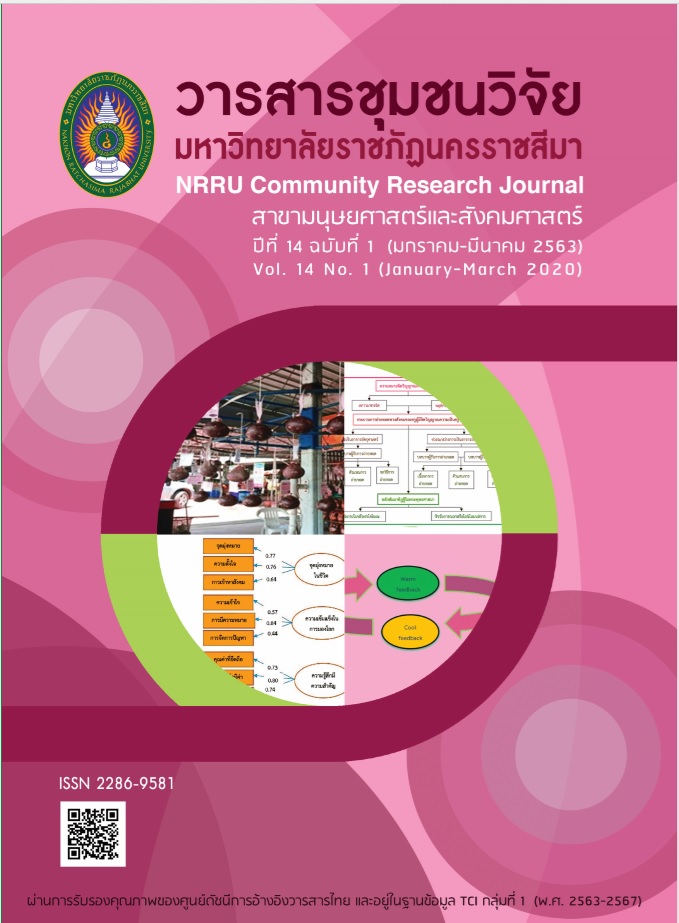กระบวนการถ่ายทอดทางสังคมของครูผู้มีจิตวิญญาณความเป็นครู: กรณีศึกษาอาจารย์คณะครุศาสตร์ มหาวิทยาลัยราชภัฏในภาคตะวันออกเฉียงเหนือ
DOI:
https://doi.org/10.14456/nrru-rdi.2020.9Keywords:
Spirituality in teacher, Socialization of teacher, Teachers at faculty of education, Case studyAbstract
The objectives of this research were to study the meaning spirituality in teachers at thai social context, to understand the socialization of spirituality in teachers and to study the conditions of spirituality in teachers at faculty of education in Rajabhat University in the Northeast. The method of content analysis was used, where data was obtained from in-depth interviews with 16 teachers at faculty of education in Rajabhat University in the Northeast has been selected by the students and colleagues is a teacher who has the spirituality in teacher. The results from studies have found that 1) the spirituality in teachers at thai social context meaning of a person has a feeling of thinking about the mind in a positive direction 4 ways were self-respectful, faithful in teaching profession, recognizes the role of teacher and teachers’ work engagement. 2) the socialization of spirituality in teachers can be divided into 2 stages, which are Stages 1 the social prior to teacher profession and Stage 2 the social during teacher profession were socialized by contents, agents and tactics. And 3) the condition of having the spirituality in teachers as a result of the study a good attitude to the teacher profession, inspiration to be a teacher and social support.
References
Bandura, A. (1986). Social Foundations of Though & Action : A Social Cognitive Theory. Englewood Cliffss, NJ : Prentice-Hall.
Burke, P. J.; & Reitzes, D. C. (1991). An Identity Theory Approach to Commitment. Social Psychology Quarterly, 54(3), 239-251.
Chao, G. M., O'Leary-Kelly, A., Wolf, S., Klein, H., & Gardner, P. (1994). Organizational socialization: Its content and consequences. Journal of Applied Psychology, 79(5), 730-743.
Darbavasu, S. (2016). Strategies for Developing Teacher Spirituality to Enhance Professional Teacher of Students in Faculty of Education, Suan Sunandha Rajabhat University. Ratchaphruek Journal, 15(1), 1-10. (In Thai)
Glickman, C. D., & Ross-Grodeon, J. M. (1998). Supervision of Instruction : a Developmental Approach (4th ed.). Needham Heights : Ellyn & Bacon.
Janesawang, D. (2011). Experience of Spirituality in Teachers: A Phenomenological Study.A Dissertation for Doctor of Philosophy degree in Applied Behavioral Science Research, Srinakharinwirot University, Bangkok. (In Thai)
Jitrodjanaruk, R. (2015). Results of the survey good teacher comments. Retrieved November 21, 2016, from https://www.kruthai.info/view.php?article_id=3693. (In Thai)
Kernochan, R. A., McCormick, D.W., and White, J. A. (2000). Spirituality and the management teacher: Reflections of three Buddhists on compassion, mindfulness, and selflessness in the classroom. Journal of Management Inquiry, 16(1), 61-75.
Khothawee, S. (2014). The development of instructional model with contemplative education approach to enhance teacher spirituality for rajabhat university student teacher. Thesis for Doctor of Philosophy degree in Curriculum and Instruction, Naresuan University, Phitsanulok. (In Thai)
Khurusapha. (1994). Education Professional Standards.Bangkok : KHRUSAPHA LATPHRAO PRINTING HOUSE. (In Thai)
Kromraruay, P., Paiwithayasiritham, C., & Polpanthin,Y. (2017). A causal model of factors affecting to teacher spirituality. Veridian E-Journal, 10(3), 836-852. (In Thai)
Luanrit, T. (2009). Development of selected performance indicators for the professional teaching standards.
Thesis for Master of Educational Program in Educational Research, Chulalongkorn University, Thailand. (In Thai)
Office of the National Education Commission. (2002). National Education Act of B.E. Bangkok : PRIKWAN GRAPHIC LIMITED COMPANY. (In Thai)
Pajak, E. & Blaise, J. (1989). The impact of teacher’s personal lives on professional role enactment: A qualitation analysis. American Educational Research Journal, 26(2), 283-310.
Palmer, J. P. (2003). Teaching with heart soul reflection on spirituality in teacher education. Journal of Teacher Education, 54(5), 376-385. (In Thai)
Rich, B. L., Lepine, J. A., & Crawford, E. R. (2010). Job engagement : Antecedents and effects on job performance. Academy of Management Journal, 53 (3), 617-635.
Seedagulrit, S. (2002). Teacher socialization factors affecting guidance teachers’professional identity and role performance. Dissertation for Doctor of Philosophy degree in Behavioral Science, Graduate School, Srinakharinwirot University, Bangkok. (In Thai)
Seethongin, S. (2006). A model for developing professional teachers’ characteristics of education students under faculty of education in nakhon Sawan. Nakhon Sawan : Faculty of education Nakhon Sawan Rajabhat University. (In Thai)
Smelser, J. (1988). Sociology (3th ed.). Englewood Cliffs : Prentice Hall.
Station, A. Q., & Hunt, S. L.(1992). Teacher socialization: Review and Conceptualization. Communication Education, 41(2), 109-137.
Stryker, S. (2000). Identity Competition: Key to Differential Social Movement Involvement. In S. Stryker, T. Owens, & R. White (Eds.), Identity, Self, and Social Movements. (pp. 21-40). Minneapolis : University of Minnesota Press.
Sungraksa, N. (2011). Synthesis study of mental and spiritual development holistic of knowledge from storytelling about success among teachers and students all teachers and students are in ed. Systems development of youth through wisdom consccousness. Silpakorn education research journal, 2(2), 21-30. (In Thai)
Tangpetchdaesho, P. (2015). Teacher spirituality and career advancement predicting job involvement of teachers. Thesis for Master of Art degree in Industrial and Organizational Psychology, King mongkut’s university of technology north Bangkok, Bangkok. (In Thai)
Van Mannen, J. & Schein, E. H. (1979). Toward a Theory of Organizational Socialization. In Research in Organization Behavior, 1, 209-264. Van Maanen2091Research in Organizational Behavior1979.





